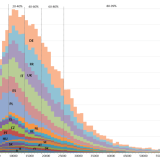
Sprawnie funkcjonujące i sprzyjające integracji rynki pracy
Sprawnie funkcjonujące rynki pracy stanowią warunek pełnego wykorzystania potencjału tworzenia miejsc pracy w gospodarce wychodzącej z kryzysu finansowego i gospodarczego. Kryzys miał bardzo różne konsekwencje dla rynków pracy w poszczególnych państwach członkowskich UE; ugodził szczególnie w niektóre grupy społeczne, m.in. młodych ludzi i osoby o niskim poziomie wykształcenia. Zachodząca obecnie w szybkim tempie zmiana strukturalna stawia także nowe wyzwania związane z ewentualnymi niedoborami siły roboczej i niedopasowaniem umiejętności w różnych sektorach i regionach.
Głównym narzędziem UE wspierającym zatrudnienie i włączenie społeczne jest Europejski Fundusz Społeczny, którego misją jest ułatwianie bezrobotnym znalezienia pracy, integracja społeczna osób znajdujących się w trudnym położeniu oraz zapewnienie wszystkim równiejszych szans. Prawa pracowników na rynku pracy reguluje także szereg europejskich aktów prawnych. Ponadto w kwietniu 2017 r. Komisja Europejska ogłosiła wprowadzenie europejskiego filaru praw społecznych. Filar czerpie z unijnej polityki społecznej i polityki zatrudnienia, a zarazem uzupełnia ją, wyznaczając kierunki rozwoju polityki w wielu obszarach niezbędnych do prawidłowego funkcjonowania sprawiedliwych rynków pracy oraz systemów opieki społecznej.
- Komisja Europejska: Europejski Fundusz Społeczny
- Komisja Europejska: Europejski filar praw społecznych




























